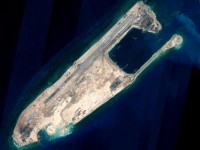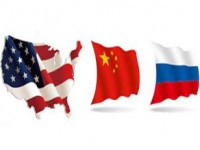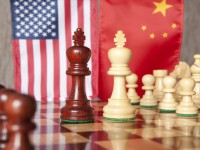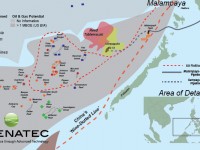
Wu Shicun, President, China Institute of South China Sea Studies
Jun 25, 2015
China-U.S. competition and rivalry in the South China Sea is structural, strategic, and irreconcilable. Preventing conflicts there from damaging bilateral ties is a practical imperative for decision-makers in both countries.
Doug Bandow, Senior Fellow, Cato Institute
Jun 19, 2015
There is increasing commentary among the chattering classes about the importance of making China “pay a price” for its aggressive behavior, but the possibility of miscalculation and misjudgment makes it even more important that all participants step back from confrontation.

Jun 18, 2015
"Issue-specific partnership, instead of alliance" may become an outstanding feature of the three countries relations in the future, but their varying relationships challenge their ability to work together to meet global problems and coordinate global governance.
Chen Xiangyang, Director and Research Professor, CICIR
Jun 15, 2015
In its eagerness to reassert its supremacy in the Asia Pacific, Washington risks losing its balance amid competing strategic goals, by forcing a position that is neither fair nor legally supportable in a region far from its shores.

Fu Ying, Founding Chair of Center for International Security and Strategy, Tsinghua University; China's former Vice Minister of Foreign Affairs
Jun 10, 2015
While Washington has mixed feelings toward China’s rising international status, many American scholars see no convincing reasons for the United States not to support or participate in China’s initiatives like the modern Silk Road and the Asian Infrastructure Investment Bank. That’s a good omen for the concept of “a new type of major country relations,” as proposed by Chinese President Xi Jinping, to avoid confrontation between big powers and to blaze a new trail of mutually beneficial cooperation.
Dan Steinbock, Founder, Difference Group
Jun 05, 2015
Despite obstacles, the White House continues to push preferential trade deals in Asia and Europe. But neither can reverse the erosion of U.S. innovation and in Asia Pacific the proposed pact is more likely to divide than unify the region.
Michael Swaine, Senior Associate,Carnegie Endowment for Int'l Peace
Jun 05, 2015
The ongoing dispute threatens to drive U.S.-China relations permanently in a far more adversarial, zero-sum direction and destabilize the region.
Doug Bandow, Senior Fellow, Cato Institute
Jun 03, 2015
Beijing’s role in the Rim of the Pacific Exercise (RIMPAC), a multi-nation maritime operation, has become a point of controversy, even leading some U.S. leaders and analysts to suggest revoking an invitation. Losing a RIMPAC invitation may not deter Beijing’s more aggressive movements, and also reaffirm charges of U.S. containment.

Stewart Taggart, Founder & Principal, Grenatec
May 28, 2015
South China Sea territorial claims — at least in Reed Bank — is really about energy. If all sides recast dangerous nationalistic posturing to more hard-headed economic calculation, it opens the way for more rational, mutual gain negotiations. These could center upon joint development of South China Sea resources. This, as an alternative to war.
Wang Wenfeng, Professor, China Institutes of Contemporary International Relations
May 26, 2015
While the US president is the architect of foreign policy, its development is both a top-down and bottom-up process. As the 2016 election approaches, it’s important to listen to those at operational levels within the government and scholars in academic circles, to see how the public consensus about the US-China relationship is evolving.
Back to Top

- China-US Focus builds trust and understanding between the U.S. and China through open dialogue among thought leaders.
- Our Offerings
- Topics
- Videos
- Podcasts
- Columnists
- Research Reports
- Focus Digest
- Stay Connected
-
Thanks for signing up!
- Get the latest stories from China-US Focus weekly.